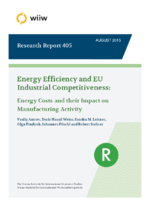Energy Efficiency and EU Industrial Competitiveness: Energy Costs and their Impact on Manufacturing Activity
Vasily Astrov, Doris Hanzl-Weiss, Sandra M. Leitner, Olga Pindyuk, Johannes Pöschl and Robert Stehrer
wiiw Research Report No. 405, August 2015
81 pages including 33 Tables and 19 Figures
Summary
Environmental objectives of the EU and the widened energy price gap between the EU and the United States have recently given rise to concerns about the competitiveness of European manufacturing industries, particularly their energy-intensive branches. The study demonstrates that industrial end-user prices for gas and electricity in the EU have indeed gone up strongly relative to some of its main competitors, largely on account of the network costs component. At the same time, over the past two decades there have been marked advances in energy efficiency in response to energy price shocks. These advances have been driven primarily by technological improvements (although in the NMS a structural shift has also played a role), particularly in the case of electricity and in the long run. However, these did not fully offset the energy price increase, so that the energy cost shares have generally gone up. The study empirically demonstrates that this has had some detrimental effect on industrial competitiveness, although the latter has been generally overshadowed by the impact of other cost components such as labour costs.
Keywords: energy sector, energy prices, energy costs, energy intensity, industrial competitiveness
JEL classification: Q40, Q41, Q4
Countries covered: China, European Union, Japan, Russia, USA
Research Areas: International Trade, Competitiveness and FDI, Sectoral studies
